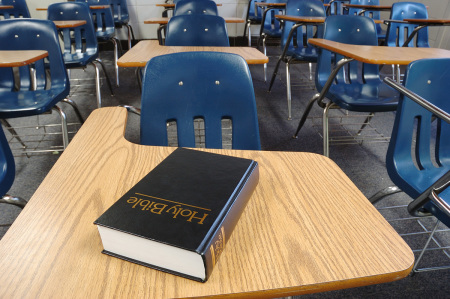The Christian Post's top 10 news stories of 2024 (part 1)

8. States effort to place the Bible and Ten Commandments in public schools
Debates over the extent to which the Bible and the Ten Commandments can be displayed or studied in public schools erupted in some states this year, with measures being passed and litigation ensuing.
In Louisiana, Gov. Jeff Landry signed House Bill 71 into law in June, mandating that public school classrooms display "certain historical documents," among them the Ten Commandments, the Mayflower Compact, the Declaration of Independence and the Northwest Ordinance.
The measure mandates classrooms have an 11-by-14-inch display along with an accompanying "context statement" explaining the Ten Commandments' historical influence.
"Recognizing the historical role of the Ten Commandments accords with our nation's history and faithfully reflects the understanding of the founders of our nation with respect to the necessity of civic morality to a functional self-government," stated the legislation.
"Including the Ten Commandments in the education of our children is part of our state and national history, culture, and tradition."
Not long after HB 71 became law, the American Civil Liberties Union, the Freedom From Religion Foundation and Americans United for Separation of Church and State filed suit against the law on behalf of an interfaith group of parents.
"[F]or nearly half a century, it has been well settled that the First Amendment forbids public schools from posting the Ten Commandments in this manner," read the complaint.
"Plaintiffs seek a declaratory judgment that the Act is unconstitutional and preliminary and permanent injunctive relief to prevent Defendants from (i) implementing rules and regulations in accordance with the Act, (ii) otherwise seeking to enforce the Act, and (iii) displaying the Ten Commandments in any public-school classroom."
U.S. District Judge John W. deGravelles, an Obama appointee, issued a lengthy ruling and order in November, temporarily blocking enforcement of the law while the litigation continued.
"Plaintiffs have established a viable Free Exercise claim," wrote deGravelles. "H.B. 71 is not neutral toward religion, and this is evident from the text of the statute, its effects, and the statements of lawmakers before and after the Act's passage."
Later in November, a three-judge panel of the U.S. Court of Appeals for the 5th Circuit issued an order allowing the law to take effect in the school districts that do not have parents challenging it.
In June, Oklahoma State Superintendent Ryan Walters garnered national headlines when he issued a directive telling public schools to implement a more Bible-centered social studies curriculum.
Walters justified the move in an interview with The Christian Post in July, arguing that "it is of the utmost importance that our kids get a full understanding of American history."
"Obviously, that includes the most read book in American history, the most purchased book in American history, the most cited book in the 17th and 18th centuries, the Bible," said Walters.
"We're not going to allow left-wing extremists and the teachers union to keep the Bible from schools in its historical context. So, we're very proud to be the first state to put the Bible back into classrooms and make sure that our kids understand its impact in American history."
Walters' directive garnered much criticism from assorted groups, among them the Washington, D.C.-based Americans United for Separation of Church and State.
Rachel Laser, president and CEO of Americans United, told CP in July that she believed Walters' efforts were an "unconstitutional effort to indoctrinate and religiously coerce public school students."
"Public schools are not Sunday schools. Ryan Walters has repeatedly made clear that he is incapable of distinguishing the difference," she stated. "Ryan Walters is on a crusade to abuse the power of his public office and impose his religious beliefs on everyone else's children in Oklahoma."
Norman Public Schools Superintendent Nick Migliorino was among public school officials in the state who were on record saying that they would refuse to enforce the Bible directive.
"I'm just going to cut to the chase on that. Norman Public Schools is not going to have Bibles in our classrooms, and we are not going to require our teachers to teach from the Bible," Migliorino told The Norman Transcript this summer.
"The standards are clear, and our curriculum is very clear. And we're not going to deviate from that. I don't know. I'm just going to be direct on that one."
In October, a coalition of parents, teachers and clergy from different religious backgrounds filed a complaint against Oklahoma education officials over the social studies directive.
The Texas State Board of Education voted last month to approve a new curriculum that introduced optional Bible-based teachings for public elementary schools.
The curriculum seeks to infuse Bible teachings into various subjects, particularly reading and language arts, for students from kindergarten to fifth grade. While districts can opt out of implementing the lessons, those that accept it will receive additional state funding.
Groups opposed to the curriculum include the South Asian Americans for Voter Empowerment Texas, which claimed that the changes "risk transforming our public schools into platforms for promoting a single religious viewpoint, undermining the diversity that makes Texas strong."
According to SAAVETX's advocacy platform, the inclusion of the Bible-related curriculum in public schools "undermines religious freedom and ignores Texas' cultural diversity."
A supporter of the approval, Keisha Russell, senior counsel for religious advocacy group First Liberty Institute, stated that "Supreme Court precedent has repeatedly confirmed that the Bible is appropriate for instruction in history, literature, poetry, music, art, government, social customs, values, and behavioral sciences."
Michael Gryboski contributed to this report.






















